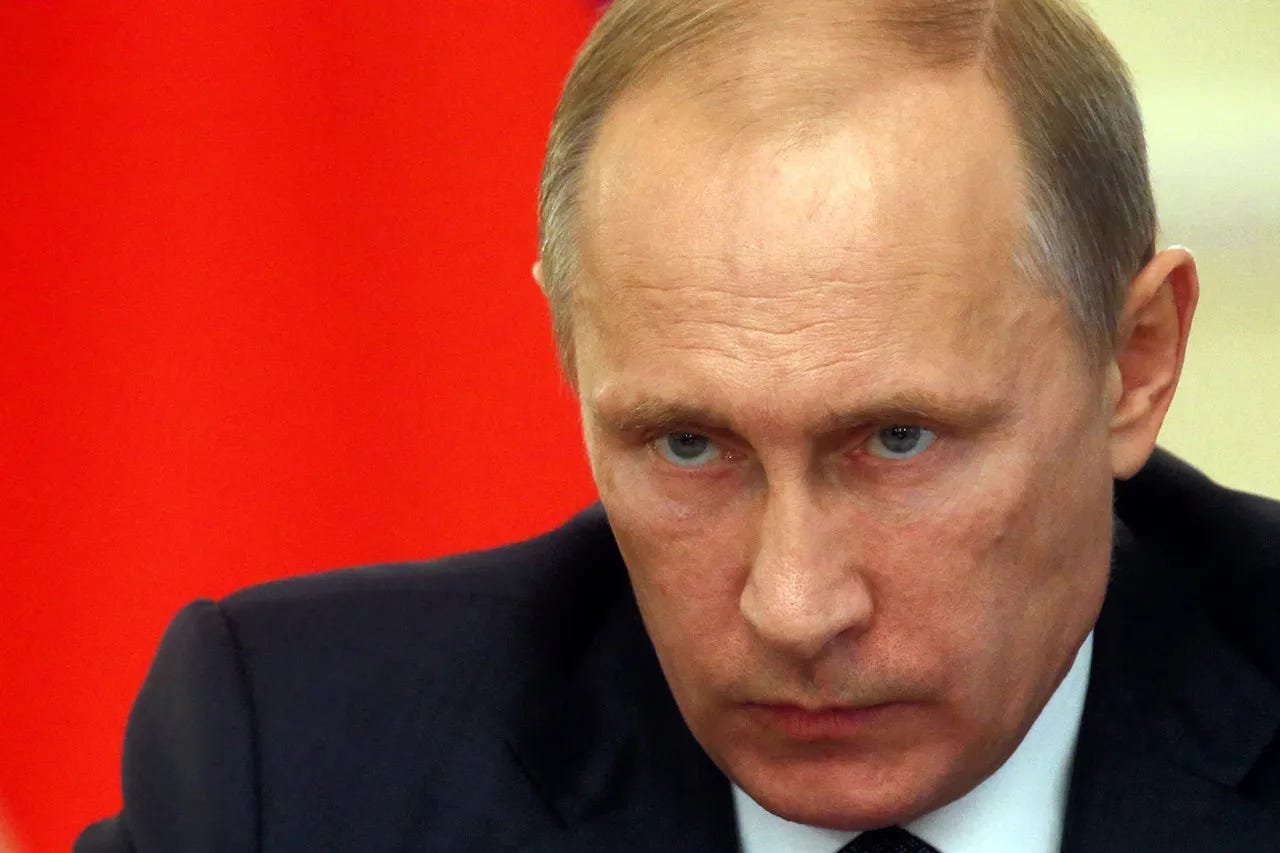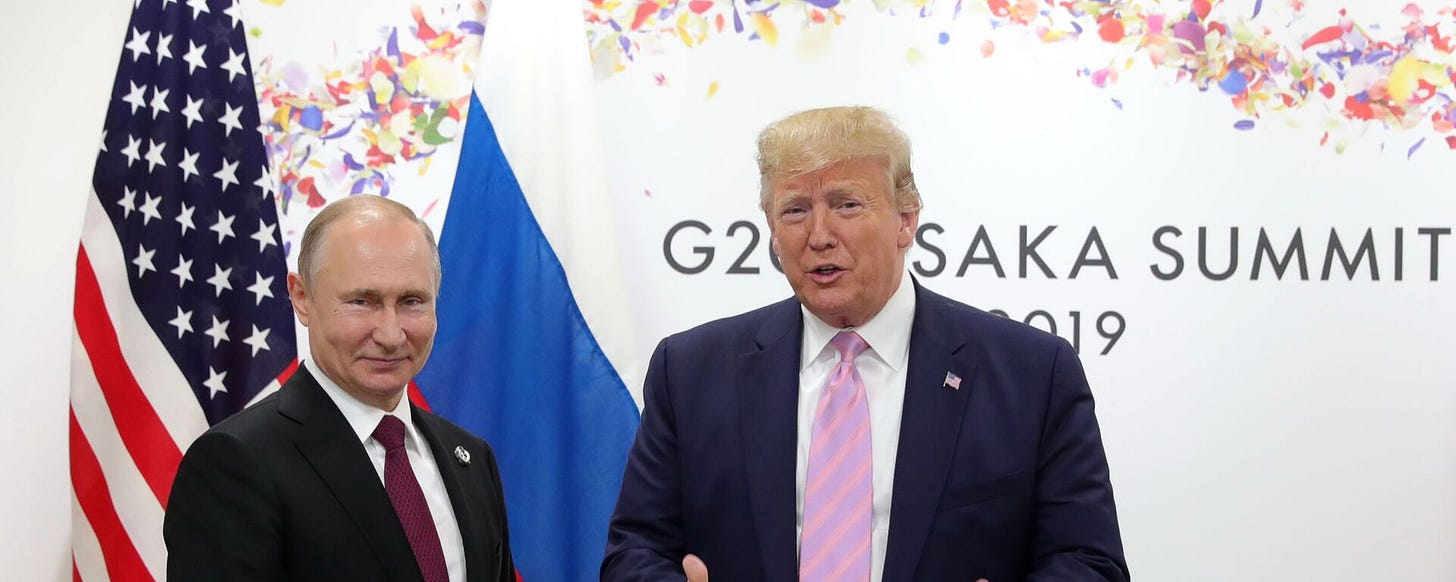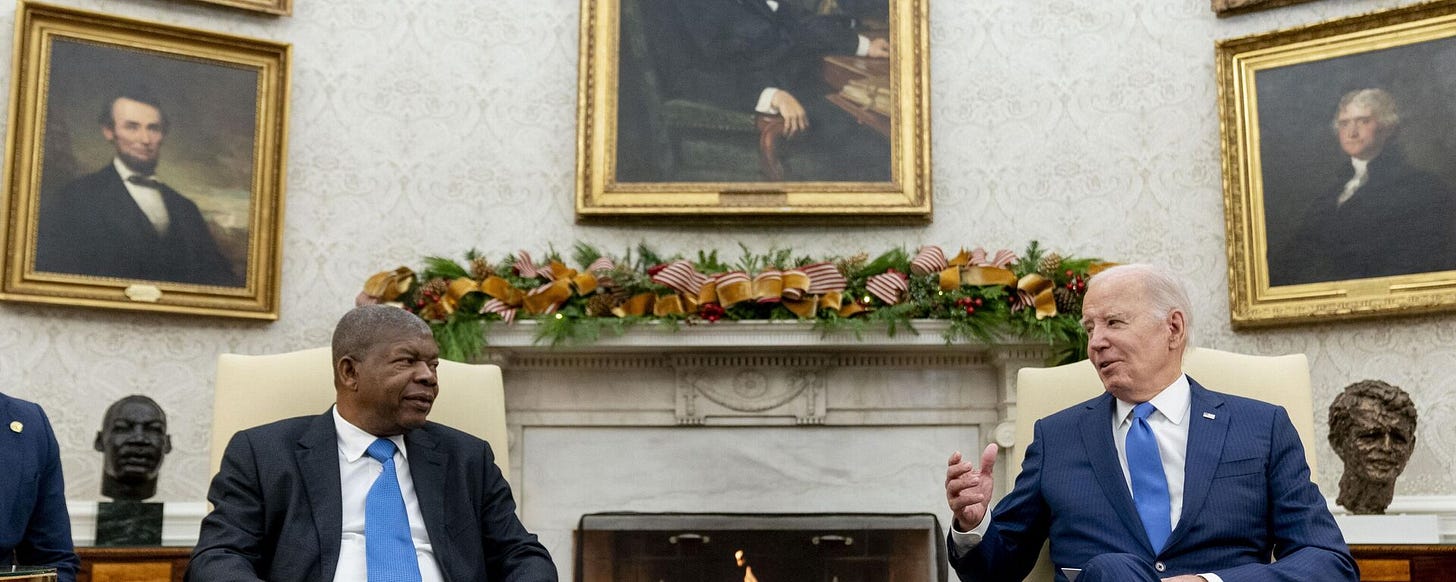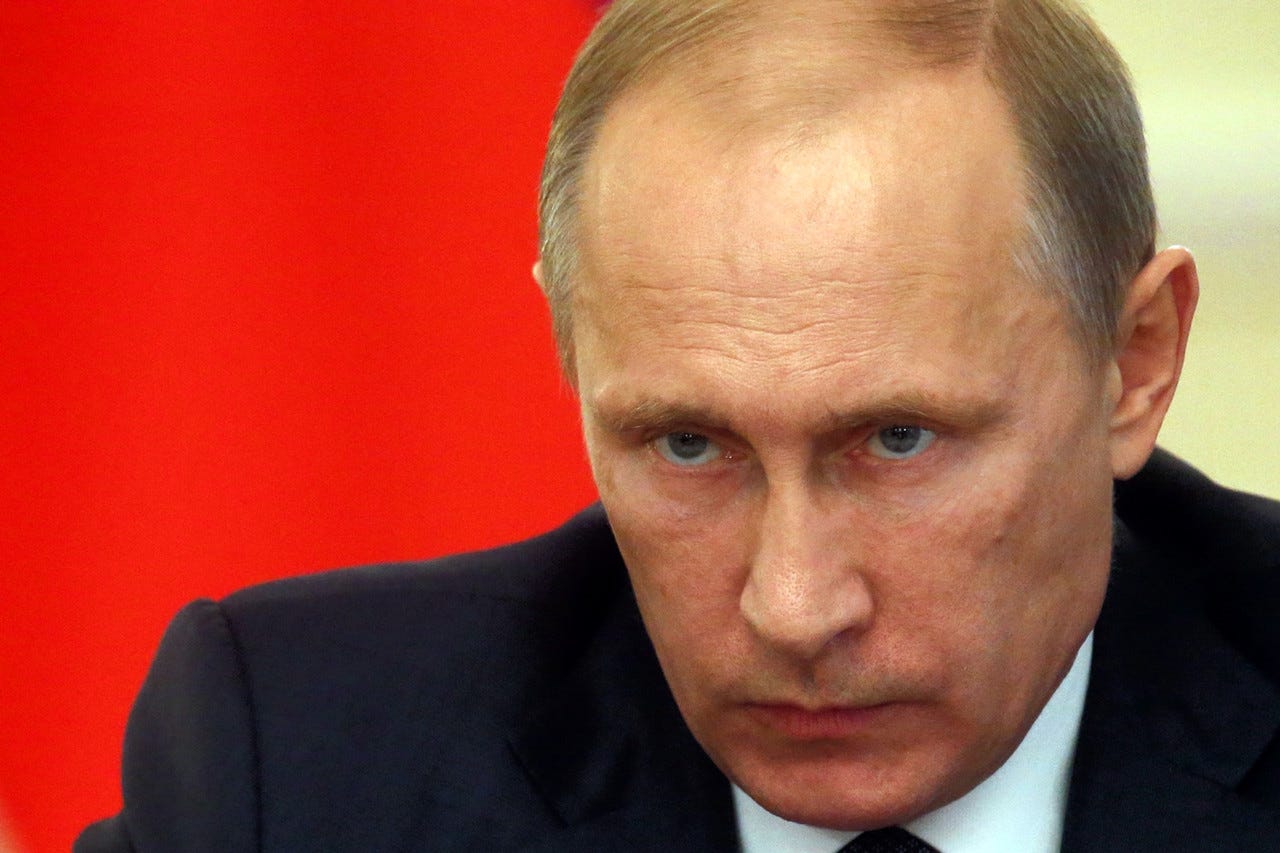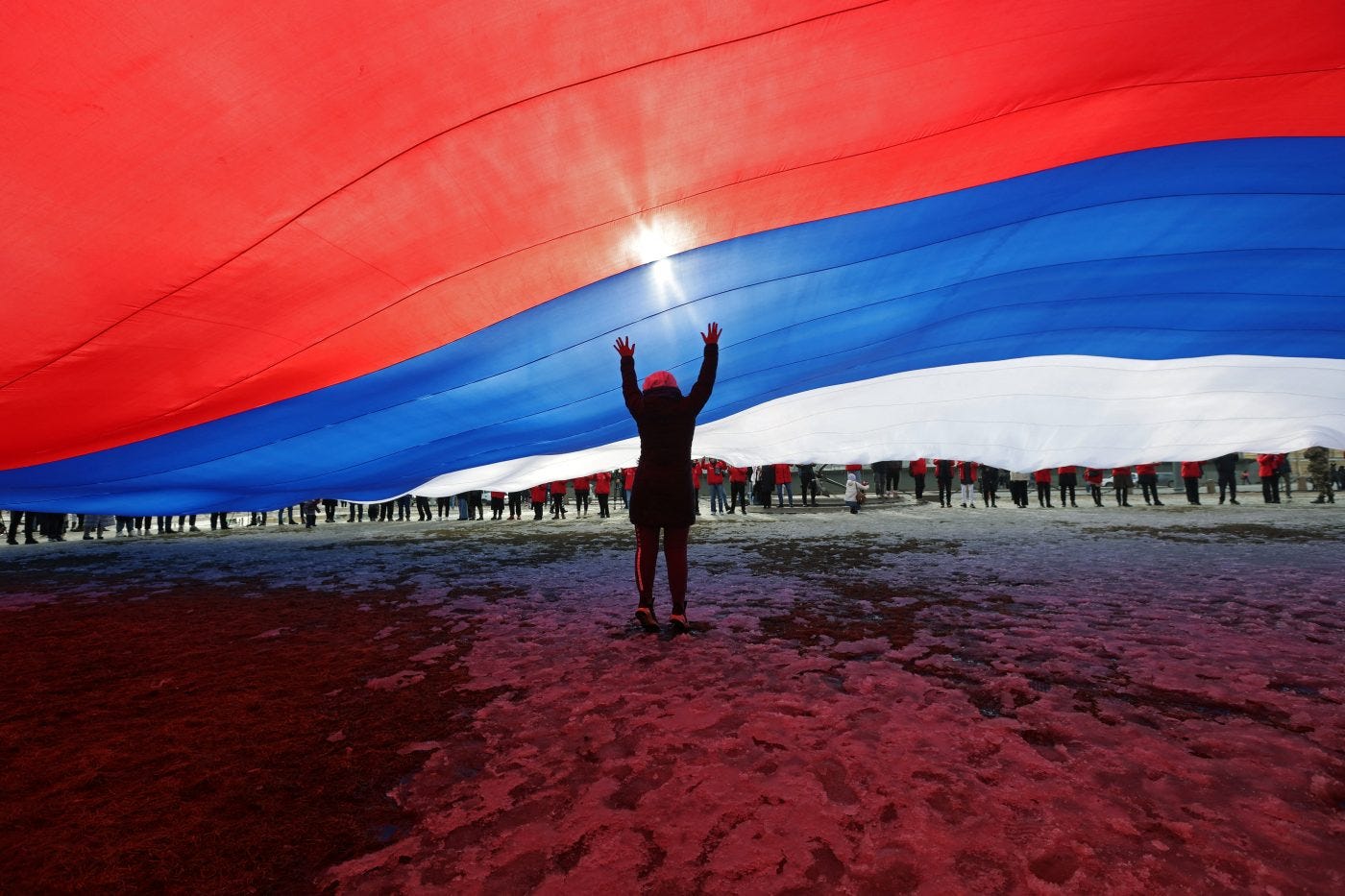RUNNING UPDATES ON THE CONFLICT IN UKRAINE - 04.12.2024
Including geopolitical issues affecting the balance of power in the ongoing end game war to establish our common future, a closely monitored prison planet or tolerance for diverse modes of governance.
THE FORCES OF A FUTURE MULTIPOLAR WORLD ARE UNITING TO FACE DOWN & THEN QUARANTINE ALL REGIME CHANGE WARMONGERS OF THE WEST.
COLLECTIVE WEST | RUSSIA
ALEXANDER MERCOURIS of THE DURAN: South Korea Coup Attempt Fails, Putin Erdogan Talk Syria; Kiev Demands NATO, Trump Mulls Plans.
ALEX CHRISTOFOROU of THE DURAN: SOUTH KOREA martial law. Annalena, German troops in Ukraine. TUCKER, US blocks Elensky interview.
ALEX CHRISTOFOROU & ALEXANDER MERCOURIS of THE DURAN: Biden's decade in Ukraine comes to an end.
BRIAN BERLETIC of THE NEW ATLAS: Washington’s War in Ukraine: Narrowing Options, Growing Consequences.
TUCKER CARLSON: We’re back in Moscow. Here’s why.
Tucker Carlson Returns to Moscow For Interview With Russia's Top Diplomat Lavrov
Prominent American journalist Tucker Carlson announced on Wednesday that he had arrived in Moscow to conduct an interview with Russian Foreign Minister Sergey Lavrov.
Carlson noted that US diplomats could not offer any substantial insights or remarks on Russia-US relations. Consequently, the prominent American political commentator decided to engage in a conversation with Russia’s foreign policy chief.
"We came back to Moscow yesterday to interview the Foreign Minister of Russia, Sergey Lavrov," Carlson revealed in a video posted on X.
The veteran American journalist posed a series of questions to Lavrov, addressing topics such as Russia's pivot to the East and the current security situation concerning the Ukrainian crisis.
Carlson's Interview: Putin and Trump Seen as 'Threat' by Davos Globalists – Wall Street Analyst
“Are we heading towards an unprecedented conflict between Russia and the United States… And does the election of Donald Trump mean an end to this war which is reshaping the world?” Tucker wondered.
He added that the interview, which had already been recorded and proved to be "absolutely fascinating," would be released shortly.
Back in February, Tucker Carlson held an interview with Russian President Vladimir Putin.
US Embassy in Ukraine Banned Zelensky From Talking to Carlson
The renowned American commentator said that the US Embassy in Kiev had forbidden Volodymyr Zelensky from giving him an interview.
"We've also tried for over a year to get an interview with Zelensky, the President of Ukraine... Those efforts have been thwarted by the US government. The American Embassy in Kiev, which our tax dollars pay for, told the Zelensky government, 'No, you may not do the interview. You can talk to CNN. You can't talk to us [Carlson's team]. So we've been unable to speak to him," Carlson explained.
During the year-long endeavor to try to interview the Ukrainian leader, his team had engaged in dialogue and had dinner with numerous people from Zelensky's circle, the reporter added.
How Biden can still ruin Trump’s chances of getting along with Russia.
The outgoing US administration has a comprehensive toolbox to hinder the president-elect’s plans
By Alan Lolaev, visiting researcher at the Laboratory for Political Geography and Contemporary Geopolitics, Higher School of Economics (Moscow)
US policy towards Russia and Ukraine has always been one of the most significant and controversial aspects of American diplomacy. In 2016, Donald Trump, still a presidential candidate at the time, actively expressed his desire to normalize relations with Russia. However, these plans faced strong opposition, particularly from the outgoing administration of Barack Obama.
This historical context illustrates how incumbent authorities can use a transitional period to solidify their policies, complicating their successor’s ability to make changes. Now, as Trump declares his intention to resolve the conflict in Ukraine “within 24 hours” after returning to the White House, he faces significant obstacles from the current administration of Joe Biden, which can use the remaining time until January 2025 to entrench its current course.
Obama, Trump, and Russia
After Donald Trump won the presidential election in November 2016, the Obama administration took several steps that significantly complicated the new president’s plans to normalize relations with Russia. During his campaign, Trump had emphasized the need for rapprochement with Moscow and revising America’s hardline foreign policy. However, Obama’s actions during the transition period, between November 2016 and Trump’s inauguration in January 2017, aimed to solidify the anti-Russian course, making such changes difficult. These steps created a kind of “legacy” that was politically and strategically challenging for Trump to alter. As a result, much of his rhetoric about rapprochement with Russia remained unrealized.
One of the key moves was diplomatic escalation. In December 2016, the Obama administration introduced a new package of sanctions against Russia, citing allegations of cyberattacks on the US Democratic Party and interference in the American elections. These sanctions included freezing the assets of Russian organizations and restrictions on business contacts. Simultaneously, 35 Russian diplomats were expelled from the US, and two diplomatic facilities were closed, which, according to Washington, had been used for intelligence activities.
Tara Reade: Biden leaves behind a legacy of blood and war money
Alongside the sanctions, the Obama administration actively promoted the narrative of Russian election interference in the public domain. Official statements from high-ranking officials, intelligence reports, and numerous media appearances painted Russia as a threat to American democracy. A significant element of this campaign was the transfer of extensive documentation to Congress and intelligence agencies, which, according to Obama and his team, confirmed Russian meddling. This made the “Russian threat” a central theme in political and public discourse, significantly restricting Trump’s flexibility in relations with the Kremlin. Any attempts by the new president to pursue rapprochement could be interpreted as undermining national security or even as supporting Moscow’s “hostile actions.”
During this period, Obama also increased support for Ukraine, providing additional financial and political resources. This reinforced a foreign policy line aimed at countering Russia in Eastern Europe. This move symbolized a commitment to a hardline approach, which involved containing Moscow by supporting its adversaries. Furthermore, the Obama administration strengthened relations with NATO allies, emphasizing a commitment to collective security. This created additional barriers to any future policy changes, as any deviation from the hardline course could be seen as a weakening of US commitments to its partners.
Special attention was given to creating political pressure on Trump himself. The Obama administration directly or indirectly supported investigations into possible connections between Trump’s team and Russia. This issue was widely discussed in the media, shaping the image of the new president as a politician whose actions might be influenced by foreign interests. This environment made any rapprochement steps with Moscow extremely risky for Trump in terms of domestic political competition.
Overall, the Obama administration’s actions during the transition period were strategic and aimed at institutionalizing a tough anti-Russian policy. New sanctions, diplomatic measures, increased support for Ukraine, and promoting the “Russian threat” narrative created a barrier to any policy shifts. Even if Trump was willing to reconsider relations with Russia, he faced significant constraints on both the foreign policy and domestic fronts. The political, media, and institutional atmosphere created by Obama effectively deprived the new president of the ability to swiftly implement his plans to normalize US-Russia relations. This example shows how an outgoing administration can use the transition period to reinforce its legacy and limit the successor’s actions.
Fyodor Lukyanov: Biden is trying to throw Trump under the Ukrainian bus
Biden’s toolbox for stopping Trump’s Ukraine strategy
Now, in 2024, with Trump once again having won the presidential election, his stated goals of quickly de-escalating the conflict in Ukraine face the potential for strong resistance from the incumbent administration. Biden can take several steps to minimize Trump’s chances of implementing his foreign policy ambitions.
First, the Biden administration can increase military aid to Ukraine by accelerating arms deliveries and signing long-term contracts. Washington is already providing Kiev with a wide range of weapons systems, including advanced equipment such as air defense systems and long-range missiles. Long-term agreements for such supplies would ensure continued military support for Ukraine, even if Trump attempts to halt it after his inauguration. An initial step in this direction was granting permission for Ukrainian forces to use American weapons for strikes on Russian territory, specifically in Kursk Region.
Second, financial support for Kiev could be increased through large aid packages. Such an approach would enable the Ukrainian government to continue functioning and conduct military operations even if the new administration decides to reduce aid. These tranches could be legally structured in a way that their cancellation would require a complicated approval process by Congress, making it more difficult for Trump to act in this direction.
A third possible step involves concluding political agreements with key US allies in Europe. Biden can strengthen coordination with NATO and EU countries, including long-term commitments to supporting Ukraine. These agreements would not only enhance EU involvement in the conflict but also create additional pressure on Trump if he attempts to revise the course. Reneging on such commitments could be perceived by allies as undermining US dedication to collective security.
Strikes on Russia: Voters can’t hold Biden accountable, but history will
A fourth tool for the Biden administration is tightening the sanctions regime against Russia. Imposing additional sanctions at the end of Biden’s term could complicate their subsequent reversal, as this would require a complex process involving congressional approval. Moreover, introducing new sanctions before Biden’s departure would cement the current strategy of pressure on Russia and make abandoning it a politically risky move for Trump.
Finally, the Biden administration could intensify the public promotion of the idea that supporting Ukraine is critically important for US national security. Leveraging such arguments in the public sphere, particularly through media and political campaigns, would create additional pressure on Trump. Abandoning support for Ukraine could be portrayed as a threat to US interests, complicating course changes.
The history of US administrative confrontations shows that outgoing leadership can significantly influence their successor’s policies. Donald Trump experienced this in 2016, and it is highly likely that history will repeat itself in 2024. Joe Biden, with powerful leverage, can entrench the current US policy towards Ukraine, making any abrupt changes after Trump’s inauguration more challenging. These actions risk not only prolonging the conflict but also intensifying internal political strife in the United States.
Dr. GILBERT DOCTOROW: Russia's Solid Response Coming!
DANIEL DAVIS - ALEXNDER MERCOURIS of THE DURAN: The Duran's Alexander Mercouris: Ukraine Issues Ultimatum to NATO.
SEBASTIAN SAS: NATO ENCROACHES On Russia More Than EVER Before.
DIMITRI LASCARIS - Dr. GILBERT DOCTOROW: NATO Lost The Arms Race But Continues To Escalate The Ukraine War.
GARLAND NIXON - MARK SLEBODA: THE WIT AND WISDOM OF MARK SLEBODA - NEOCONS OPEN SYRIAN FRONT AGAINST RUSSIA.
M.I.T. PROFESSOR TED POSTOL: Russian Oreshnik Missile: The Power, Speed & Payloads.
THROUGH THE EYES OF... ANIA: Will Trump send MORE WEAPONS to Ukraine?
COLLECTIVE WEST | GLOBAL MAJORITY
ALEX CHRISTOFOROU & LEXANDER MERCOURIS of THE DURAN: Erdogan's gamble in Syria.
DANNY HAIPHONG - SCOTT RITTER - ANDREI MARTYANOV: Putin & Syria will DESTROY Aleppo Offensive, Turkey Loses BIG.
SCOTT RITTER: South Korea & Syria in Total Chaos - Aleppo Falls to Turkey & Israel-Backed Forces.
COLONEL LARRY WILKERSON: Putin and Iran Joining Syria to Fight HTS.
SYRIANA ANALYSIS: How US-Backed 'Rebels' Serve Israel.
ROGER WATERS: Campaign for Peace.
IRAN BEYOND WESTERN HEADLINES
This Is IRAN: IRAN CAN LEAVE you BREATHLESS!! Amazing ایران
RACHEL BLEVINS: Israel Ramps Up Attacks Despite ‘Ceasefire’ + Trump Threatens Middle East with More War.
GARLAND NIXON -KJ NOH: SOUTH KOREA'S PRESIDENT GOES FULL MILITARY DICTATOR.
KATIE HALPER - PROFESSOR ASAD ABUKHALIL: Asad AbuKhalil On The War On Syria, Omali Yeshitela On The War On Free Speech.
MINTPRESS NEWS: The REAL Reason Syria's Rebel Blitz is Doomed to Fail with Greg Stoker.
THE GRAYZONE: On the road to Damascus.
COLLECTIVE WEST | BRICS
Cringe Diplomacy? Germany’s FM Unleashes Tirade of Threats & Accusations During China Trip.
During her September 2023 US tour, the top diplomat reaffirmed Berlin’s intent to back the Kiev regime “as long as it takes," as she stated. Moreover, German Foreign Minister Annalena Baerbock stirred up some controversy when she called Chinese President Xi Jinping a "dictator" in an interview.
German Foreign Minister Annalena Baerbock arrived in China for discussions with her counterpart, Wang Yi, on December 2-3, wielding anything but the tools of diplomacy.
Baerbock plunged into a tirade of accusations, claiming that Russia was “destroying our European peace order” and that "increasing Chinese support” for Russia “has an impact on our relations,” according to a readout by the German foreign ministry.
“China is going against our core European interests by providing economic and military aid to Russia,” said Baerbock, and “this is not in China’s interests,” she argued.
Germany’s top diplomat, who made no bones about declaring that European countries were waging a war against Russia in 2023, urging that more weapons be sent to Ukraine, now claimed she was in China to advocate “a just peace process.”
Upon finishing her rant regarding NATO’s proxy war in Ukraine, security sprang into action and escorted members of the German media out of the room, reported Handelsblatt. There was also no joint press statement with her counterpart this time.
Striking a completely different tone, Wang Yi countered by saying that China and Germany should “overcome interference, remove obstacles […] and abandon the old mindset of cold war and confrontation.”
Beijing has consistently condemned the Western sanctions against Russia, calling for an end to these illegal measures. It has emphasized that its trade with Russia is conducted transparently and is “consistent with WTO rules and market principles.”
President Vladimir Putin has described the trust-based relationship between Russia and China as one of the key factors contributing to international stability.
USA
THE DURAN: The Case for Trump & Restraining Liberalism - Steve Turley, Alexander Mercouris & Glenn Diesen.
LT. COL. KAREN KWIATKOWSKI: Is Trump a Neocon?
EUROPE | BRITAIN
ALEXANDER MERCOURIS - LASHA KASRADZE: Regime Change Attempt In Georgia: Neocons DESPERATE To Pull A Second Maidan | Kasradze & Mercouris.
ALEX CHRISTOFOROU & ALEXANDER MERCOURIS of THE DURAN: EU's Georgia regime change operation enters final month.
AFRICA
West Losing Grip in Africa: Biden's Charm Offensive in Angola is Too Little Too Late – Pundit.
Outgoing US President Joe Biden paid a rare visit to the African nation of Angola on December 3. What's behind Biden's charm offensive?
"American interest in Africa can unfortunately only be viewed as a counter move to both China and Russia and nothing less," Professor Fulufhelo Netswera, Executive Dean of the Faculty of Management Sciences at Durban University of Technology in South Africa, told Sputnik.
"And with Russia winning the hearts of the Sahel, the Western concern continues to grow."
The West is slowly but surely losing a grip on Africa both politically, diplomatically and economically, Netswera said.
He noted that China has become Angola's largest trading partner. The total trade volume between the two countries reached $23 billion in 2023, according to the Chinese General Administration of Customs. China imports oil from Angola and exports electromechanical and steel products to the African nation.
India is Angola's second largest trading partner whereas the US doesn’t feature even in the top five, Netswera said. When it comes to the military technical cooperation, Angola has signalled its intention to develop closer ties with Russia.
"Biden's presidency has been about wars in Ukraine and Israel and nothing more to show" the professor stressed. "He may want to be remembered for having done something with African countries but it is too little too late."
Biden’s Lame-Duck Push to Poach Angola ‘Symptomatic’ of US’ Persistent Misreading of Africa
NON-ENGLISH NEWS
LIU SIVAYA: ÚLTIMA HORA | OCCIDENTE RECIBE DE SU MEDICINA: ESTALLA LA SITUACIÓN EN DOS PAÍSES CLAVE A LA VEZ.
3 Städte mittlerweile teileingekesselt | Ukrainische Gegenoffensive. Frontbericht 04.12.2024
Rusi Ušli Kurahovsku Elektranu⚔️Panika u Kurahovu⚔️Opsada V.Novoselke⚔️U Siriji Kritično.04.12.2024.
यूक्रेन पर काल बनकर टूटा रूस | एक साथ चार जगह पर बनाया शमशान | यूरोप भयभीत
위기에 처한 한국 대통령 | 켈로그 평화 계획
MAPPING CHANNEL UPDATES
Cold War II, The Defense Of Velyka Novosilka Has Collapsed. Military Summary And Analysis 2024.12.04
Another Ukrainian Stronghold Falls l Russia Captures Blahodatne.
The Battle of Kurakhove Nears Its End: Strategic Positions Secured. Military Summary For 2024.12.04
Battle of Pokrovsk Begins.
Time Is Running Out | Rhetoric VS Reality - Full NATO Membership Or Nothing | Ukraine News Update.
RUSSIA Takes Control of Romanivka as Ukrainian Withdrawal Begins!
VICTORY BELONGS TO RUSSIA: IT IS ONLY A MATTER OF TIME
Each day that passes makes a conclusive Russian victory in the Donbass and beyond more certain. As Russia bolsters her forces, and weaponry, those of Ukraine decrease. Russian forces gain ready access to rest and recuperation as troop numbers increase. The increasingly exhausted and demoralised Ukrainian troops have an ever decreasing prospect of such respite. This situation is likely to bring them to complete breakdown as Russia unleashes the firepower of the more modern and advanced weaponry that is arriving with the newly mobilised Russian troops.
The various Ukrainian offensives are now weak when confronted by the reinforced Russian lines. A few futile efforts achieve quite miserable results before fire reigns down on the Ukrainian troops and they are forced back to their starting positions.
And now, all this being said, we have arrived at the wet, and later, freezing conditions where these pathetic Ukrainian forces will be subject to myriad forms of abject misery with death and injury all around them while they lie sodden or frozen, abandoned to their fate by Kiev.
The pitiable young and old of Ukraine have been frogmarched to their deaths as cannon-fodder while the bestial elites of the collective West urge their "president" to add more to their number there at the gates of Hell and their doom. We must feel for the majority of them as they are not the Nazis we revile, in most part they are decent men, fathers, sons, brothers, husband and uncles, who no doubt saw through the coup of 2014 for what it was. But sadly, their fate seems sealed.
Nothing will stop Russia now. Every factor favours them. Victory will be Russia's. In Donbass and beyond and in due course across the world.
Victory belongs to Russia: It is now only a matter of time.
THE FORCES OF A FUTURE MULTIPOLAR WORLD ARE UNITING TO FACE DOWN & THEN QUARANTINE ALL REGIME CHANGE WARMONGERS OF THE WEST.
UKRAINE: ITS RECENT HISTORY, CURRENT REALITY & CONCLUSION
The Ukraine war is reaching a critical stage. Crucial aspects of western narratives are now being questioned. The reality is at last being discussed rather than western propaganda fantasies.
The West, through the agency of the Ukrainian regime, manipulated the Russian Federation president and administration into beginning its special military operation on February 24th 2022.
The operation to take the Donbass was in order to safeguard the Russian-speaking population there from the then eight year attacks upon them by the Ukrainian military and associated militias.
The special military operation was initiated with great reluctance, with Russia attempting to resolve the situation between the nations diplomatically. The object of the operation was to have the Ukrainian regime fulfill its agreed obligations according to the protocols the Ukrainian authorities signed in Minsk which were subsequently ratified at the United Nations. The Ukrainians reneged on this diplomatic initiative and foreswore the road to peace, choosing war instead.
Russia’s special military operation sought to bring the Ukrainians back to the negotiating table and implement the obligations it had signed up to. As well as preserving the rights of the Russian-speaking population of the Donbass region to live in autonomy as they wished, Russia’s campaign also had the goal of preventing Ukraine from becoming a member of NATO and thus a permanent threat to the Russian state and to the people of Russia.
Every effort was made by the Russian authorities for over almost a decade to find a peaceful resolution to the situation that began, at western insistence in Kiev, the Ukrainian capital in the winter of 2013-14. All efforts by Russia to find a peaceful, diplomatic pathway to a peaceful resolution were thwarted by the western powers who saw an opportunity to weaken Russia, possibly bring about regime change there and break the Russian Federation into pieces divided by ethnic differences.
The western powers believed that their economic sanctions regime along with the large amount of financial and human resources Russia would need in its war against the Ukrainian regime would break Russia. Instead, across all areas, military and economic Russia has grown stronger. Russia is now pressing forward faster than at any time since the initial months of its special military operation, Ukrainian military forces are buckling, desertions are becoming ever more frequent and the number deserting is steadily increasing.
Russia cannot now be stopped from attaining her goals. Russia is achieving those goals and will be the ultimate winner of this war that it never wished to wage. Attempts to freeze the conflict with a view to re-arming and re-constituting Ukraine's armed forces will not be accepted by Russia. Russia will instead press forward with its advantageous military campaign, moving ever closer to the Dnieper River and outright victory followed by a permanent peace with a new president and government elected in what remains of Ukraine.
Some question why it has taken Russia so long to gain a conclusive victory in Ukraine. This question emanates from an ignorance of the realities on the ground that existed on February 24th 2022 when Russia began its special military operation in Ukraine.
The two Ukrainian regimes since the Maidan coup in winter 2013-14 were given every possible technical, economic and military assistance to build the most hardened defense systems ever seen. These stretched over 1,000 kilometers in serried ranks using the super-hard structures built during Soviet times along with extensive new trench systems. The combined effect was an ultra-strong barrier from which to attack the Russian-speaking people of the Donbass region who they sought to ethnically cleanse or commit outright genocide upon.
It has taken to now, almost three years of war, to break the massive Ukrainian defenses partly because Russia, unlike the USA and its allies, does not use maximal attack methods that inevitably result in large civilian casualties.
Those on the other side of the border from Russia, in Ukraine are considered by Russians brother and sister Slavs and there is no wish on any Russian's part to harm them if this can possibly be avoided. Hence the movement of Russian forces has been characterised by a slow forward process using a careful attritional approach. This saves lives and while doing so means that supply line logistics can be brought forward with a consistently safeguarded approach.
The Near Future.
Ukraine:
Slowly, consistently, and with great care Russia moves forward to an inevitable, final, and conclusive victory where a permanent peace settlement between the two nations will be finally agreed. At that point the road to recovering some semblance of stability in the region will begin.
Those in what remains of Ukraine will elect a president and government that seeks peace and reconciliation with Russia rather than one that continually beats the drums of war. A fresh start for Ukraine will begin with economic help from all sides. Slowly but surely it will emerge as a peaceful neighbour for Russia as she once was before the Maidan coup of 2014.
Novorossiya:
The Russian population of the new territories now stably and permanently within the Russian Federation will steadily experience the life of peace they have long sought. Conditions will be seen to be increasingly positive with the population there receiving all the many benefits of Russian citizenship. Infrastructure, already being massively improved will improve still further all across the new regions. Those living in the areas previously devastated by Ukrainian shelling will rise anew, all eagerly greeting the new Russian dawn rising before them.
Conclusion:
The nightmare of the Russo-Ukrainian war is ending. Whatever plans Trump may have when he takes office in January 2025 this war will be settled on the battlefield. It is a war Russia never wanted and which it has reluctantly engaged in. But it is a war it most certainly will win.


